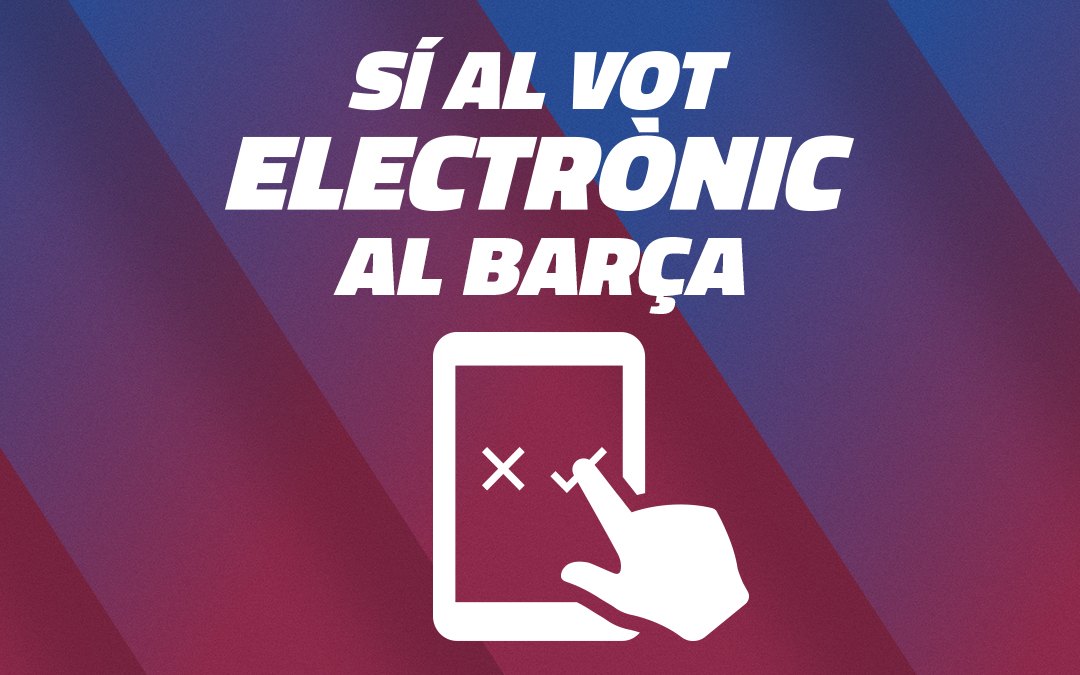

The Sí al futur project organises an information and dissemination session on electronic voting on Thursday 28 March, from 10 am to 1 pm, at the UPC Vèrtex building’s auditorium (Plaça d'Eusebi Güell 6, Barcelona). All those currently registered on the Sí al futur website are free to attend the event. No reservation is needed. Simply send an e-mail to Info@sialfutur.cat stating full name and confirming attendance. Feel free to come any time in the morning provided there is room available at the 100-seat auditorium. You may come in and out at leisure, provided it is at the end of each session.
Sí al futur, the project led by Víctor Font seeking to offer a new proposal to all FC Barcelona members when the next elections to the Club’s presidency are called, thinks that electronic voting is a strategic tool to get all Barça members involved in the life of their Club. Electronic voting should allow all members to get involved and participate when the time comes to elect the new president or approve any great decisions of the Institution, especially those of a more symbolic type. Its use may help get more members involved in the decisions that to date have been made at the Delegates’ Assemblies. Members should also have the opportunity to have their say on those issues on which the Board of Directors would like to listen to their voice.
Sí al futur is of the opinion that technology today makes this possible in a safe, clean and reliable way. It further understands that the Club should promote any necessary legislative changes, as well as any changes in internal regulations of FC Barcelona, to make it possible.
This session will look at all these aspects. It will start at 10 am and will be conducted by journalist Laura Rosel.
This is the schedule:
10 am
Paper by Pere Vallès, president of Scytl Electronic Voting
Is electronic voting safe and reliable? Is it easy to use? (practical demonstration)
10:30 am
Analysing a number of success cases:
a) Catalonia’s Professional Association of Odontologists and Stomatologists
b) Switzerland
11:00 am
Paper by Pere Vilà, legal advisor to the Catalan General Secretariat of Sports and coordinator of Catalonia’s draft bill on Sport and Physical Education in Catalonia.
Is there room for electronic voting in Catalan sport?
11:30 am
The transparent, participative and democratic Barça we all want
Discussion:
1.- Representative from FC Barcelona
2.- Ramon Besa, journalist
3.- Fermí Puig, chef
4.- Pilar Calvo, journalist, politician and entrepreneur
5.- Carles A. Foguet, communication consultant and politics expert. Head of the sports area in the Gaps agency (political strategy and communication)
Moderator: Laura Rosel
12:30 pm
Closing words by Víctor Font
...that FC Barcelona’s democratic and participative vocation is so rooted in the Club that, during the dark period of Franco’s regime, a period singularly marked by the lack of liberties, Barça found a way to hold a presidential election with universal – or quasi-universal – suffrage? This unprecedented event took place on 15 November 1953, when the Club held elections to choose a president, in which only male members were allowed to vote. We should explain this obvious violation of women’s rights. In France women were not allowed to vote until 1945, and in Italy until 1946, to name but two examples. Going back to our story, it should be added that the event was a resounding success: more than 17,000 members, or 63% of the electors, took part. The winner of the election was Mr Francesc Miró-Sans Casacuberta, who inaugurated then his eight years at the helm of Barça. This participation success was probably the reason why the Francoist authorities gave the idea a second thought and would never allow a similar participation process again.